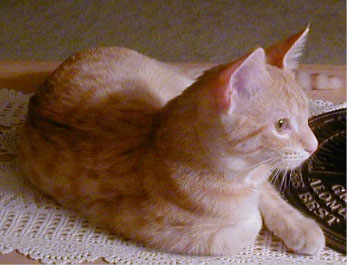
Every year MEOW takes in a few cats and kittens with Feline Leukemia Virus (FeLV). Thanks to adopters who are educated about this virus, we have been extremely fortunate to place these cats into permanent homes. We’d like to share the answers to some common questions about FeLV.
What is feline leukemia virus and how do cats get it?
Feline Leukemia Virus (FeLV), a retrovirus, is so named because of the way it behaves within cells. Cats persistently infected with FeLV serve as sources of infection. The virus is shed in very high quantities in saliva and nasal secretions, but also in urine and feces. Cat-to-cat transfer of the virus may occur from a bite wound, during mutual grooming, and (though rarely) through the shared use of litter boxes and feeding dishes. Transmission can also take place from an infected mother cat to her kittens, either before they are born or while they are nursing. FeLV doesn’t survive long outside a cat’s body under normal household conditions.
How common is the infection?
In the United States, approximately 2% to 3% of all cats are infected with FeLV. Rates rise significantly— to13% or more—in cats that are ill, very young, or otherwise at high risk of infection.
What should I do to support my FeLV+ cat?
Keep your FeLV positive cat indoors to reduce his exposure to other infectious agents carried by animals, and to prevent the spread of the infection to other cats. Feed him a nutritionally complete and balanced diet. Alert your veterinarian to any changes in your cat’s health.
How long can I expect my FeLV+ cat to live?
It is impossible to accurately predict the life expectancy of a cat infected with FeLV. With appropriate care and under ideal conditions, infected kittens can remain in apparent good health for two or three years. Most succumb to a FeLV-related disease. Although 85% of cats with FeLV infection die within 3 years of the diagnosis, some cats, especially those acquiring the disease as adults, may live several years.
Can people become infected with FeLV?
Feline leukemia is specific to felines and cannot be transferred to humans or pets of other species.

